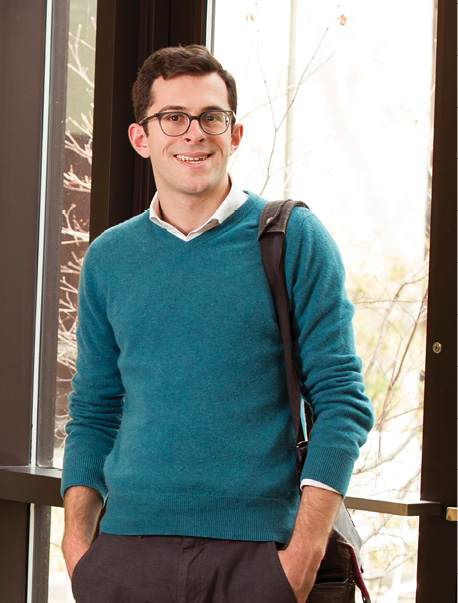By Seth Robertson

Law school wasn’t part of Larry Crane-Moscowitz’s plans. Or at least that’s what he thought after graduating from the University of Pennsylvania’s Wharton School in 2010. Economics degree in hand, he accepted a job as an analyst with Goldman Sachs and was assigned to a team that managed the firm’s liquidity and collateral around the globe.
“We managed the firm’s funding on a day-to-day basis,” he said. “I thought I would work at GS for the foreseeable future. Graduate school really wasn’t on my mind.”
Two years later, though, Crane-Moscowitz found himself reviewing contracts related to the development of a new banking entity with Goldman’s legal team, and enjoying this work “far more than my other projects.” That insight led him to apply to law school.
Vanderbilt became his top choice in part because of its strong Law and Business certificate program, which was started in 2001 by Randall Thomas, the John S. Beasley II Professor of Law and Business. “I visited…and really fell in love with the school,” said Crane-Moscowitz, a member of the Class of 2016. “I had an opportunity to talk with Professor Thomas about the Law and Business Program and with Professor [Tracey] George, who has been a tremendous source of guidance throughout my first and second year. They were, and continue to be, great sounding boards.”
The Law and Business Program offers an intensive interdisciplinary curriculum for second- and third-year students considering a career in business law. Students who fulfill the requirements receive a certificate of specialization in addition to their J.D. degree. The program comprises five core classes, plus an elective curriculum designed to help students understand the intricacies of finance, accounting and corporate governance.
“The certificate program was started in response to an initiative by the university to solicit proposals for interdisciplinary research and teaching ideas between various schools,” said Thomas, who serves as the program’s director. “Those of us who teach in the transactional area felt that our students needed a much stronger background in corporate finance and accounting. So we created a curriculum that would give them all the basic legal courses they needed—corporations, securities regulation and tax—and then added full semester-length courses in finance and accounting.”
Based on his experiences working at a complex investment bank like Goldman Sachs, Crane-Moscowitz originally thought he would focus on corporate transactions. But he discovered an interest in litigation both in the classroom and outside it. “I spent last summer working at the Securities and Exchange Commission on enforcement,” he said. “Now I’m excited about the potential of doing corporate litigation.”
The certificate program can be completed within the normal three-year timeframe for earning a J.D., unlike the more intensive J.D./M.B.A. program, which requires an additional year of study. Typically, more than 60 J.D. and LL.M. students earn the certificate each year. “The student response has been terrific,” Thomas said. “We’ve gone from having maybe 15 to 20 percent of the student body complete the certificate requirements in the early years to having 35 to 40 percent today.”
In addition to the required core classes, the Law and Business Program offers several transactional skills courses, as well as an array of short courses on topics that range from private equity to the deal dynamics of mergers and acquisitions. The short courses are taught by both practitioners and judges, including several from the Delaware Court of Chancery, which, due to that state’s dominance in the corporate incorporation business, handles a high volume of major business cases.
“We usually have three or four judges from the Delaware courts come here to teach every year,” Thomas said. “It gives students an opportunity to network and also exposes them to how judges think about the law.”
The Law and Business Program also benefits from its location next to the Vanderbilt Owen Graduate School of Management. The proximity of the two schools facilitates collaboration between faculty members, and a shared interest in trans-institutional work drives joint efforts like the annual Law and Business Conference held every spring. This year’s conference brought academics together with regulators from the SEC to discuss evolving areas of federal financial regulation. “There are already lots of interactions between the law and business school,” Thomas said. “The business school is literally next door to us. Students are able to go back and forth between the two schools and take classes, and faculty members of both schools often collaborate. I see that only continuing in the days ahead.
“The Law and Business Program is in a good spot, and I’m optimistic about what the future holds for it.”